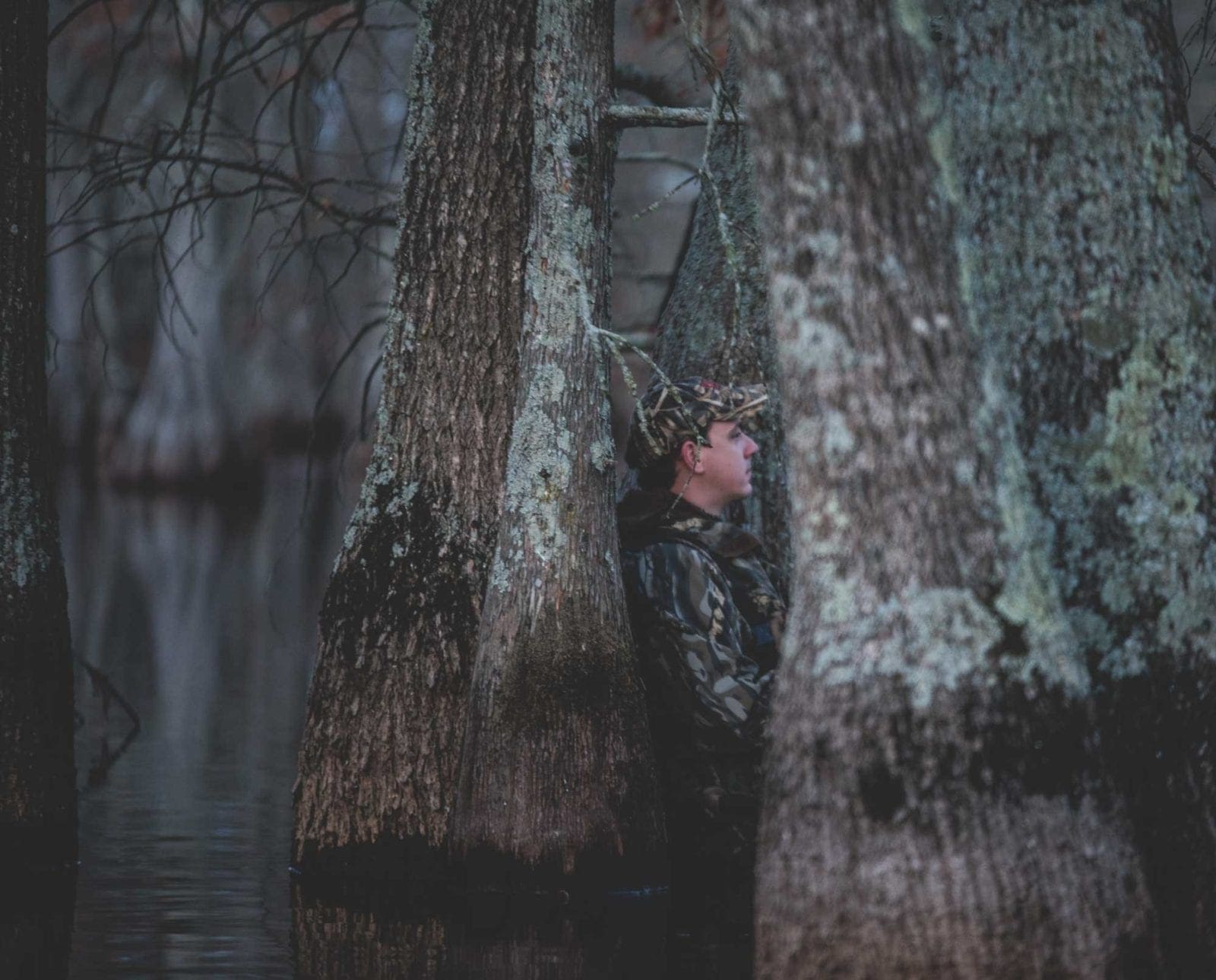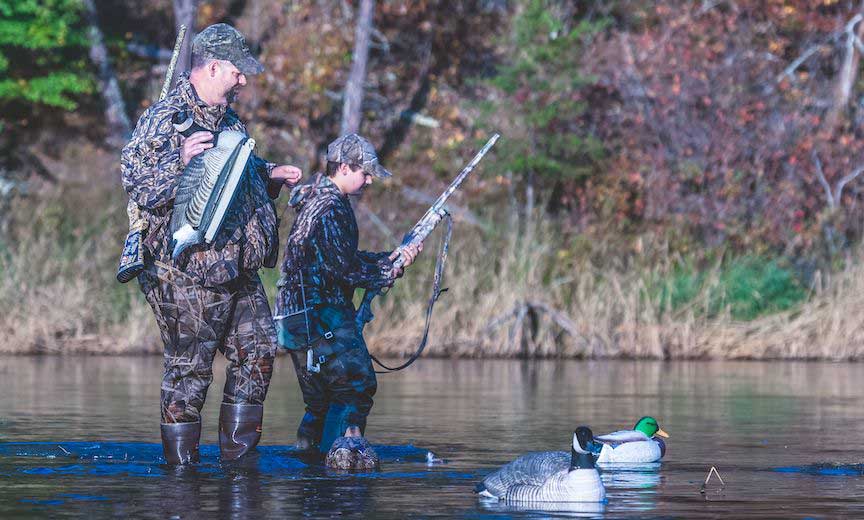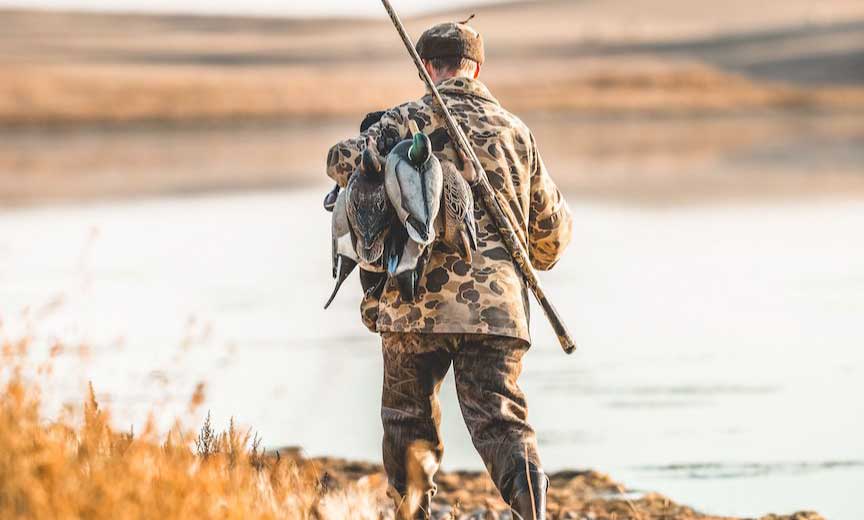Home » Waterfowl Hunting » Duck Hunting Advice to a Younger Me
Duck Hunting Advice to a Younger Me

Brad Stefanoni grew up hunting quail and waterfowl in southeast…
With age and experience comes wisdom; for this duck hunter, the ability to travel back in time would save a lot of trouble
We have all heard it said many times, “If I knew then what I know now . . .” I’ve said it myself dozens of times. But it wasn’t until a duck hunt a couple of years ago that I had the maturity to really examine that statement.
My hunting partner, Mike, and I stood near a clump of trees in the southeast corner of my marsh and watched flock after flock of mallards dive into our spread of six decoys. After we both dropped three greenheads in a matter of minutes we set our shotguns against a tree and simply watched the show until sunset.
“If I had known when I was 17 years old that it only took six decoys to have a hunt like that I would’ve never wasted all that money buying decoys,” I said, half jokingly.
“Yeah, and you know, we have about $300 of duck calls between us and neither of us has touched one all afternoon,” proclaimed Mike with a chuckle.
“I wish I could send my younger self an email with a list of all I’ve learned over the last thirty years and somehow convince my young, stubborn self to actually believe it,” I joked out of the side of my mouth.
I’ve thought about that hunt many times. I realized that while I couldn’t travel back in time to school as a teenager I could still pass along my experience to the next generation of waterfowlers. The following are but a few of the things I wish I had known and taken to heart more than thirty years ago when I was young and thought I knew everything.
Ask yourself why you want to be a waterfowler and answer honestly
When I was in my teens and learning the craft of waterfowling, I’m not going to lie to you–it was all about the shooting. I wanted to shoot ducks and I wanted to shoot a limit. And I wanted my hunting partners to also shoot their limits. Why? For the rush of adrenaline and for “grip and grin” photos after the hunt, that’s why.
I was much older and a father before I really started to know the true answer to the question of why I hunt waterfowl. It was no longer about pulling the trigger and hanging ducks on a duck strap. It was about the experience. To experience a moment in time with family and friends and create a memory to cherish for a lifetime.
I won’t fault any new waterfowler for wanting to shoot. Heck, I still want to shoot ducks, too. But I challenge all the up and coming waterfowlers to open your minds to living in the moment to enjoy the experience for what it is, an experience.
Find a mentor
I cannot stress enough the importance of a good mentor. And, here’s the funny thing, the mentor benefits from this relationship just as much as does the mentee.
Each mentor is unique in both what they bring to the table and how they share it. Diversity is a virtue. A good mentor will usually be quick to tell you all the things they have messed up over their years in the marsh as well as teach you the etiquette of duck hunting. A good mentor is patient and doesn’t tell you how to hunt. Rather, they are more of a coach, exposing you to many situations then offering subtle wisdom so you can make your own decisions. Lastly, and it’s an intangible, but a good mentor has eyes that “smile.” You’ll know those eyes when you see them.
The waterfowling mentor I had was, well, the best. I doubt he considered himself a mentor those many years ago and, if asked now, I doubt he would think what he did could be classified as mentoring.

Ken took me to his duck blind from when I was 12 years old until I graduated from college. I had never been duck hunting before as I was raised a quail and upland hunter by my family. He opened my eyes to the subtleties of waterfowling. The soft whistling of mallard wings as they passed over the blind. He took apart his duck call to show me the anatomy of calls. He let me help set out the decoys and explained why he set them a certain way based on the wind and the sun. And after every one of my shots the first thing I heard was, “Good shot, kid,” even when it wasn’t such a good shot.
Go, find a mentor, they’re out there. Attend a local Ducks Unlimited event and engage with members, they’re good people. Some are grizzled old veterans. Some are in their 20s and have a desire to help the next generation. Some, like me, are approaching that 5-0 number and will do anything within our power to help pass on what we have learned. If you’re ever near southeast Kansas look me up. I’ll put my money where my mouth is and be happy to help you any way I can.
Decoys
Here’s the deal, decoys fool people. Oh, and sometimes they even fool a duck or two. I want you to really think about the essential function of decoys. Really, think about it.
Merriam-Webster defines a decoy as, “. . . an artificial bird used to attract live birds . . .” Simple, right?
Well, let me tell you it was much simpler in 1988 when there were, basically, three mainstream decoys available to purchase in the Midwest: Flambeau, Carry-Lite, and G&H. Yes, some will argue that other decoy brands could have been purchased back in those days but, to a kid with a few dollars in his pocket, those three were available and affordable.
They were simple and plain but, dang it, they worked. I remember like it was yesterday I had a $5 mesh decoy bag and twelve Flambeau mallard decoys that I purchased with money from bussing tables at a local restaurant. I shot more ducks over those dozen mallard decoys in my youth than I’ve shot in the last five years combined over the six or seven dozen decoys I have now.
Please don’t take me the wrong way. I am in no way criticizing any of the current decoy manufacturers that make incredibly realistic and durable decoys. A new waterfowler’s choice in decoys these days is as diverse as the birds they are meant to fool.
My point is, buy a dozen or two decoys you can afford and will last you awhile. Do your homework to float them in someplace where ducks want to be and you will have success. It’s not always about which decoy has the best paint colors or feather detail. It’s more about tossing a few good decoys out in the right place at the right time.
Shotgun
This seems like a basic piece of equipment and it should be. However, advancements in manufacturing technology and frankly, marketing, have muddied the waters a bit.
If I were a brand new waterfowler right now it would be challenging to choose the right shotgun to suit my needs. Semi-automatic, pump, or double-barrel? Composite stock or traditional wood stock? Camo finish, classic blued finish, or Cerakote finish? If semi-automatic should it be one of the newer inertia operated models or a gas operated model?
So. Many. Options. And, I haven’t even broached the subject of budget yet!
Okay, take a deep breath and repeat after me, “What I need is a shotgun that fits me and is reliable enough to shoot every time I pull the trigger.”
The two most important attributes of your shooting iron are, in my opinion:
- Which shotgun best fits me?
- What is my realistic budget?
Start out with a shotgun that fits you well and one you can affordably purchase from your local gun shop then go shoot it. Practice. Practice more. And then practice even more. The best shooters I’ve ever been around are the ones who also shot the most. Sporting clays are great but a good old fashioned round of skeet is also a great way to build hand-eye coordination and muscle memory to make you a better shooter.
I have a friend who has shot the same Remington 870 pump gun since he was 12 years old. He is now approaching the ripe age of 60 and is still shooting that same old beautiful 870. He told me one day he bought it from a family friend for $75. I can probably count on one hand the number of mallards and pheasants I’ve witnessed him miss in the more than thirty years that I’ve hunted with him. That shotgun is an extension of his body now.
My point is, find a shotgun that fits you well and one you can afford and go shoot it.
Work smarter, not harder
The older I get the more I wish I could tell this to my younger self. It’s all about using one’s brain more than one’s brawn most times.
During my high school and college years I hunted a small public waterfowl area fairly a couple of times a week at least. We always saw ducks and usually shot a few, sometimes even scratching-out nearly a limit for two or three of us.

Almost every time we hunted this spot we saw an elderly hunter who also frequented the area. When we arrived he was always sitting in his old pickup drinking coffee from a thermos. When we were out in the marsh we would see him again, mid-morning, walking the marsh levee with an old shotgun and a dozen styrofoam mallard decoys draped over his shoulder. He would disappear into the marsh and we would go back to our loud hail calling.
We realized one day that we never saw him walk the levee back to his truck. We must have always left before him. So, one day we all agreed we would await his return and engage the old boy in a chat as we shared a walk back to our vehicles.
When we met him he had three drake mallards over his opposite shoulder. When we asked him how his hunt was he quietly said, “Oh, about like usual, okay.”
We had two ducks between all three of us so we gently prodded him for some insight into his success. “Heck, kid, it ain’t no big thing, I just watch where the ducks are going then head that way. If there’s someone hunting that spot I just wait until they’re done and ease over there.”
As my pals and I loaded six dozen decoys into the back of my truck his parting words as he drove off were, “Boys, you don’t need to pack all those pretty decoys if you hunt where the ducks already want to go!”
Yeah, we had just been schooled and we knew it. That old man had seen more sunrises and sunsets in that duck marsh than the three of us could have ever dreamed about.
Do your homework. Be where the birds want to be. Work smarter, not harder.
It’s easy to get caught up in all the options, gadgets, and advice while losing sight of the bigger picture. The years of experience have given me a better perspective than I had when I was just starting out. Now, if I could only find an old DeLorean car, a mad scientist, and Marty McFly to help me travel back in time to preach all of this wisdom to my younger self!
Brad Stefanoni grew up hunting quail and waterfowl in southeast Kansas, where for the past 20 years he’s been passing on what he learned to his wife and their two sons. His diverse background includes work as a biologist, a science education center director, an outdoor writer and a developer of public/private partnerships. With a degree in wildlife biology, Brad’s current work-in-progress is transforming his family’s 80-acre farm into a living laboratory of upland and wetland habitat. His passions include spending time with his family and black Labrador retriever pursuing waterfowl and upland birds, and fly fishing.



